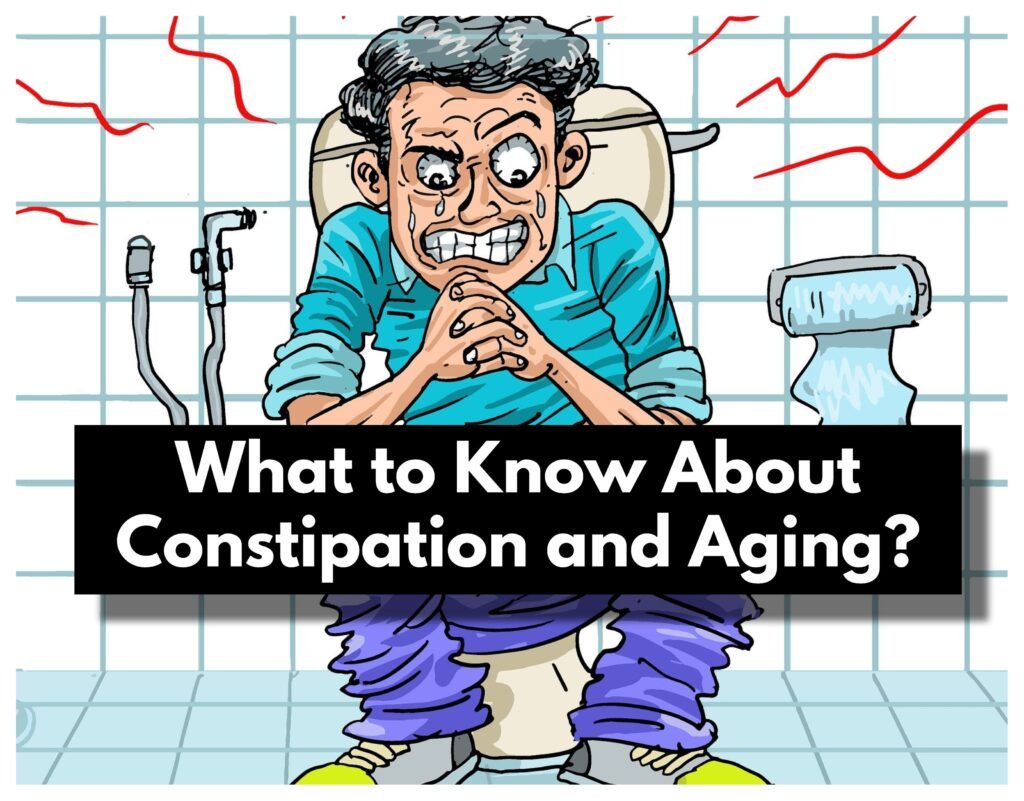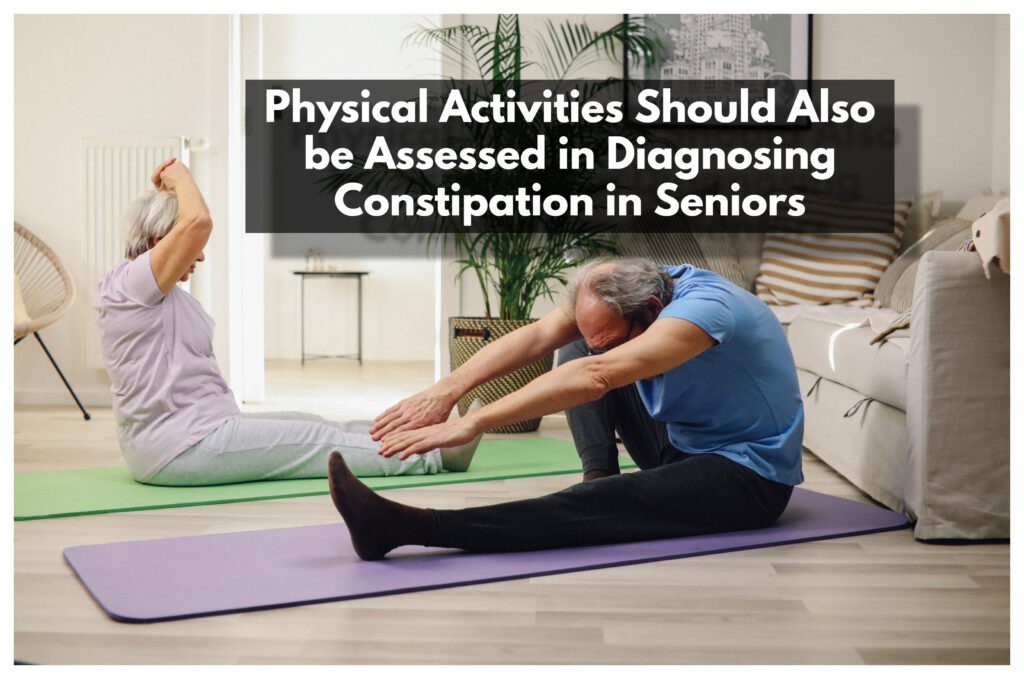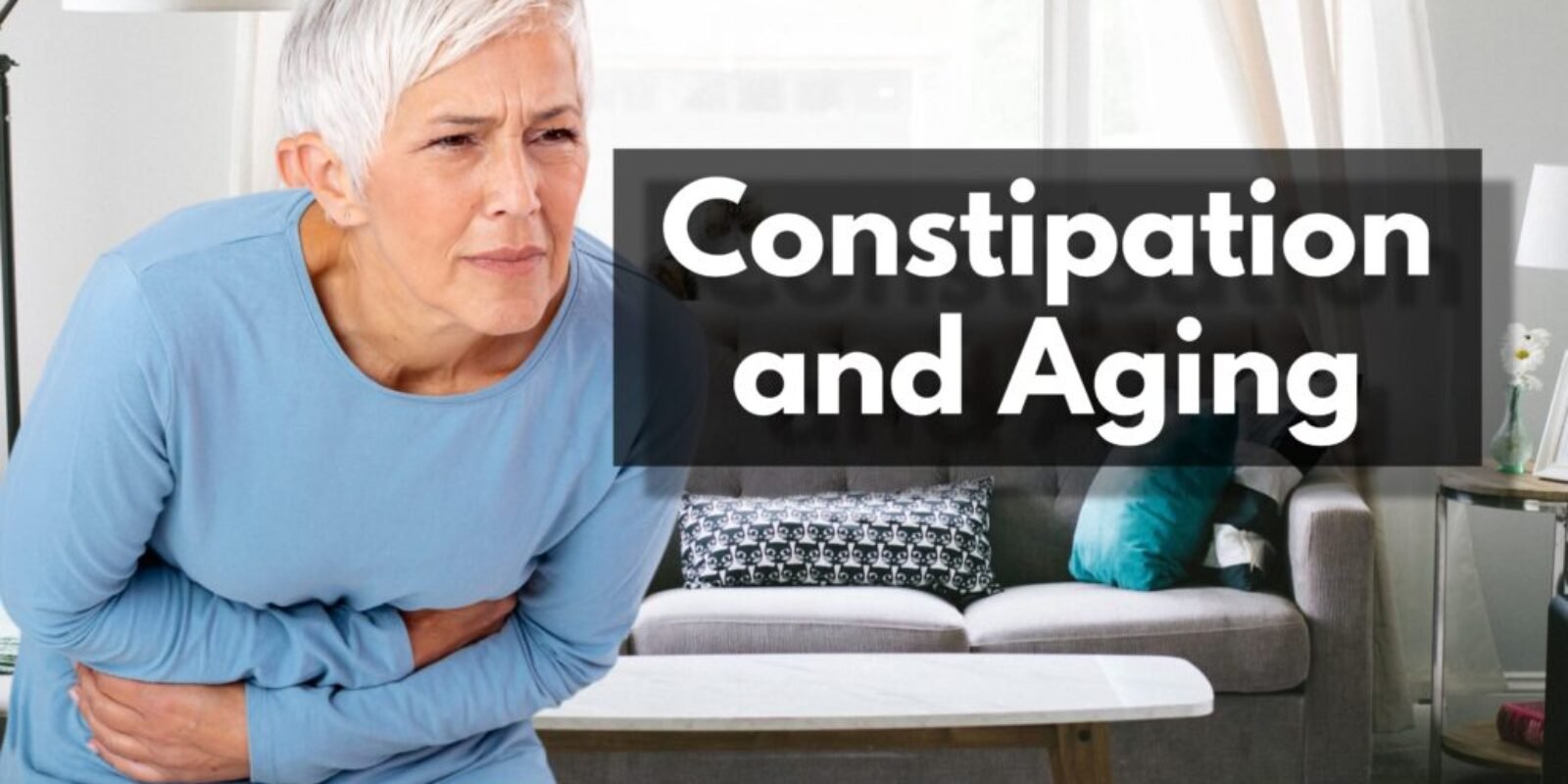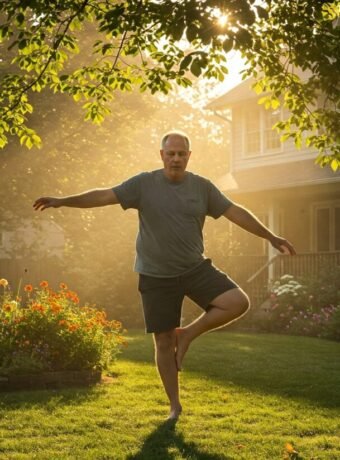For senior citizens, constipation can be a common occurrence – with reports of 8-35% of them experiencing it! Constipation in seniors can cause a range of uncomfortable symptoms, including bloating, stomach pain, and general discomfort.
More importantly, if left untreated, it can lead to more serious health problems. It’s important to understand the causes and risk factors of constipation in seniors in order to address the issue properly.
What to Know About Constipation and Aging?
Seniors may experience occasional constipation, but there are ways to manage it that can help maintain a high quality of life! It’s important to understand the underlying causes and risk factors to help prevent and treat it in this demographic. In this blog post, we’ll explore what causes constipation in seniors, how it can be prevented, and the best ways to treat it.
We will also look at lifestyle changes that can help manage and prevent constipation in seniors, as well as the medications and treatments available for them. By understanding more about constipation in seniors, we can help ensure senior citizens get the treatment they need to alleviate their symptoms.

Prefer to listen rather than read?
Common Symptoms of Constipation in Seniors
Seniors are more likely to suffer from constipation than younger adults, and the symptoms can vary greatly; from mild discomfort to extreme pain. The most common symptoms of constipation in seniors are:
Infrequent Bowel Movements
- When it comes to seniors, regular and frequent bowel movements are an important part of maintaining their health and well-being. For seniors, having a regular bowel movement can help reduce the risk of constipation, which can lead to other health problems.
- It is important for seniors to have regular and frequent bowel movements because it can help to keep the digestive system in balance and ensure that the body is getting the nutrition it needs. Generally speaking, seniors should aim for a bowel movement every 1-3 days or at least 3 times a week.
- However, if it is longer than 3 days or less than three times a week, it is important to seek help and ways to regularize bowel movements. If it gets worse, it is important to seek help from your doctor.
Difficulty Passing Stools
- Older adults experiencing difficulty passing stools may be indicative of constipation.

Hard or Lumpy Stools
- Seniors may experience constipation, which may manifest in the form of hard or lumpy stools.
Bloating
- Have you ever felt like you’ve eaten too much, or your stomach just feels full and uncomfortable? You might be suffering from bloating! Bloating is a common condition that affects millions of people.
- It’s the feeling of fullness, pressure, and even pain in your abdomen. This can be caused by the buildup of gas in your intestines, or maybe even from the digestion of particular foods.
Abdominal Pain, Nausea, and Fatigue
- Abdominal pain caused by constipation can be very uncomfortable and frustrating. It can cause discomfort, nausea, and bloating, making it difficult to go about your daily life.
Under certain circumstances, it can be common for seniors who are suffering from constipation to experience rectal bleeding or a sensation of incomplete defecation after passing a bowel movement. While this can be an uncomfortable or even distressing experience, it is important to remember that there are steps you can take in order to help avoid this issue and maintain good digestive health overall.

Causes of Constipation in Seniors
Understanding the causes and recognizing the symptoms of constipation in seniors can help caregivers and family members provide the best possible care. A number of different factors can cause it, these include:
Inadequate Dietary Fibre
- Not eating enough fibre-rich foods can be a real drag on your digestive system, leading to uncomfortable symptoms of constipation.
Dehydration
- Dehydration can also lead to constipation, which is an uncomfortable and often unpleasant experience. Unfortunately, this can be a common side effect of not getting enough water each day.
Certain Medications
- If you find yourself taking medications that cause constipation, it is important to talk to your doctor about the side effects and to look into solutions that can help.
- In some cases, your doctor may be able to prescribe a different medication that doesn’t have the same side effects or may suggest that you take a laxative or fibre supplement.
Decrease in Physical Activity
- A decrease in physical activity can limit the movement of the digestive tract, making it more difficult for food to pass through and be eliminated.
- For instance, if someone is bedridden, they may be unable to move around, which can cause their digestive system to slow down and lead to constipation.
- Other factors that can lead to a lack of physical activity and thus include age-related health issues such as arthritis, or an injury that limits mobility.
- A sedentary lifestyle can also cause constipation in seniors, as the body is not being stimulated to produce the necessary bodily functions to keep the digestive system running properly.

Diagnosing Constipation in Seniors
Diagnosing constipation in seniors requires more than simply asking about bowel movements. It’s important to take a comprehensive approach to understand the underlying factors that may be contributing to constipation in seniors. Healthcare professionals should consider other factors such as diet, physical activity, medications, psychological health, and general health status when evaluating seniors for constipation.
A dietary history should be taken in order to gain a better understanding of their eating habits. It is important to ask questions about fluid intake, fibre intake, food preferences, and any changes in eating habits or food allergies which may have arisen. It is also important to ask questions about the use of any medications or supplements, especially those containing iron and calcium, as these can cause constipation.
Physical activity should also be assessed, including how much activity the patient does on a daily basis and the types of activity they engage in. Doctors should inquire about the amount of daily activity the patient engages in and the types of activities they partake in.

Questions like, does the patient go for walks, or do low-impact exercises such as yoga or stretching? Does the patient have difficulty performing these activities? It is also important to consider if the patient is living in a care facility, as this can affect the amount of physical activity they can do.
The amount and type of activity the patient is doing can give insight into the severity of their constipation. Additionally, it can provide doctors with a place to start when recommending lifestyle changes to improve the patient’s condition, such as increased bowel movements.
Medication use should also be explored when looking into its potential causes. Certain medications, such as opioids, iron supplements, diuretics, and some antidepressants, can all cause constipation or worsen existing constipation. It is important to speak to your doctor about any medications you are currently taking to see if they could be contributing to your constipation.
They may be able to switch you to another medication that is less likely to cause constipation or suggest other treatments that can help mitigate any potential side effects. Also, when evaluating constipation in seniors, consider asking about their medications – both prescribed and over-the-counter – as well as any recent changes in diet, activity level, or lifestyle.
Review any existing medical conditions, such as diabetes, Parkinson’s disease, or thyroid disorders, as these can all contribute to constipation in seniors. Understanding the underlying causes of constipation in seniors can help inform the best treatment plan for each individual.
Seeing your doctor is the best way to find out how bad your constipation is, especially if it gets worse.
Home Remedies for Constipation Relief
Let’s explore some awesome home remedies that can help senior citizens combat constipation! Check these out:
Drink More Water
Drinking more water! It is an easy fix – try to aim for 8 glasses a day – and increasing the amount of fibre in your diet can also make a difference. Foods like beans, apples, and broccoli are great sources of fibre and can help keep your bowel movement regular.

Probiotics
If you’re looking for an extra boost, adding probiotics to your diet can also help. Probiotics are full of beneficial bacteria, which can help keep your digestive system functioning properly. Finally, don’t forget to get up and move! Regular exercise can be a great help to regularize your bowel movement.
Warm Beverages
There are also other home remedies that can help deal with constipation in seniors. These include drinking warm beverages like herbal tea or warm water with lemon, adding bran to your diet, eating more fruits and vegetables, taking over-the-counter laxatives, and taking Epsom salt baths.
It is important to note that any home remedy should be discussed with your doctor before trying it. Additionally, it is important to remember that constipation in seniors can be a sign of an underlying medical issue, so be sure to talk to your doctor if your constipation persists.
Diet Changes for Constipation Treatment
It is also important to drink plenty of fluids throughout the day and avoid processed foods, as these can slow down digestion. Eating a high-fibre breakfast is a great way to start your day and can do wonders for your digestion. Foods that are high in fibre, such as whole grains, fruits, and vegetables, can help keep your digestive system running smoothly and can even help reduce constipation in seniors.
Avoid Caffeine and Alcohol
And don’t forget to avoid caffeine and alcohol, as these can have a negative impact on your digestion. Taking time to make sure you eat a healthy and balanced breakfast every morning can make all the difference in your digestive health and overall well-being. So start your day right and enjoy a delicious high-fibre breakfast.
In addition, seniors should aim to include probiotic-rich foods such as yogurt and sauerkraut in their diet to help increase gut bacteria, which can aid in digestion.

Exercises to Help Relieve Constipation
Exercising is an awesome way to combat constipation in seniors! Regular physical activity can help reduce constipation in seniors by increasing the body’s natural processes to move material through the digestive system. Here are five exercises that can give relief to seniors dealing with constipation:
Walking
- Walking is a simple, yet incredibly powerful form of exercise that can help get your digestive tract moving and grooving! Start with short 10-minute walks around the block and gradually increase the time and intensity as you get more comfortable.
- You’ll likely find that the longer you walk, the more energized you feel. If you’re up for a challenge, try a brisk walk to really get your heart pumping and your digestive system in gear.
- Not only will walking help get things moving, but it can also help you relax and clear your mind at the same time. Don’t forget to stay hydrated and bring your favourite tunes to listen to as you go.
Cycling
- Cycling is an excellent choice of low-impact exercise that is incredibly beneficial for your body. Not only does cycling activate the muscles in the abdomen and pelvic floor, but it also helps to improve digestive motility.
- This is particularly beneficial for anyone experiencing digestive issues, as cycling can help to reduce symptoms and improve overall digestive health.
- Cycling has many other benefits too, such as increased cardiovascular health, improved muscular endurance, and increased calorie burning.
- Plus, it’s also a great way to get outdoors and enjoy the fresh air. So, if you’re looking for a low-impact exercise that can help improve your health and well-being, why not give cycling a try?
Yoga
- Gentle yoga poses are an excellent way to relax the body and stimulate the digestive tract. For those looking to reap the benefits of yoga for better digestion, focus on poses that open up the abdomen, like child’s pose, cat-cow, and seated twists.
- Each pose helps to relax and soothe the body, relieving tension and stress throughout the digestive tract, as well as helping to improve gut health. Each pose can be held for several minutes to maximize the benefits, so make sure to take your time and stay in the pose until you feel ready to move on.
- As you flow through these poses, you’ll find yourself feeling calmer and more relaxed, ready to enjoy a healthier, better-functioning digestive system.
Swimming
- Swimming is an excellent form of exercise for constipation in seniors. Not only does the buoyancy of the water help to reduce stress on the joints, but it also provides resistance that helps to work the abdominal muscles.
- Swimming gives seniors an opportunity to engage in physical activity without the fear of injury or overexertion. Gentle, constant exercise can help to improve flexibility and muscle strength, while frequent movement helps to promote digestion.
- It’s also a great way to socialize and stay active in the community, allowing seniors to enjoy the company of others while getting some much-needed physical activity.
- So, if you’re looking for a safe and enjoyable way to stay active, swimming is the perfect activity for seniors with constipation.
Pilates
- Pilates is an excellent form of exercise for seniors with constipation. It’s a great way to help strengthen your core muscles, which are so important for digestive health.
- Not only that but once you get the hang of it, Pilates can be a really fun way to stay active and improve your overall health. Start with some beginner moves like a bridge, plank, and leg lifts.
- These moves are designed to be gentle on your body and offer a great way to get familiar with the basics of Pilates.
- With regular practice, you’ll be able to experience the full benefits of this low-impact workout. Plus, you’ll be able to work on improving your core strength, muscle tone, and balance.

Ease With the Help of Laxatives
Laxatives can be a helpful tool for those who are having difficulty managing their constipation. When it comes to choosing a laxative it is important to select an appropriate one for your individual needs.
Laxatives come in a variety of forms, including tablet, liquid, or suppository form, so it is crucial to discuss your options with your doctor to make sure the one you are choosing is the best for you. The process of selecting the right laxative can be overwhelming, so it is important to do your research and talk to your doctor to make sure that the laxative you choose is the best one for your individual needs.
However, it is important to consider any potential side effects that could occur with the laxative you choose. Some laxatives can cause dehydration, electrolyte imbalances, and abdominal cramping. Laxatives can be an effective way to treat constipation, but it is important to use them as directed by your doctor and never to exceed the recommended dosage.

When to See a Doctor?
Though constipation is a common issue for many senior citizens, sometimes it can be a sign of a more serious medical condition. If a senior you love has not had a bowel movement in three or more days, or if they are exhibiting any other signs of constipation, it is important to speak to their doctor.
Wrapping It Up
To wrap it up, constipation can be a difficult condition for seniors to manage and understand. However, with the right combination of diet and lifestyle changes combined with medical advice, seniors can find relief from constipation and enjoy a higher quality of life.
It’s important to keep in mind that constipation in seniors is not a normal part of aging and you should seek medical advice if it is experienced. With the right help, constipation in seniors can be managed and they can go on to lead healthy and productive lives.
Well, do you find this post helpful to you? If so, you might also want to read The Tricky Tale of Asthma in the Elderly: Important Things You Need to Know!
Disclaimer
The content provided on MySeniors.World is for informational purposes only and is not intended as either financial or medical advice. Always consult a qualified professional before making any investment or health-related decisions.
Posts may contain affiliate links, meaning we earn a commission – at no additional cost to you, if you click through and make a purchase. Your support helps us continue providing valuable content.



















